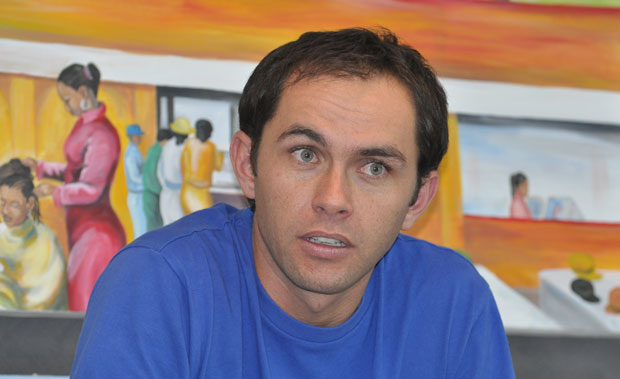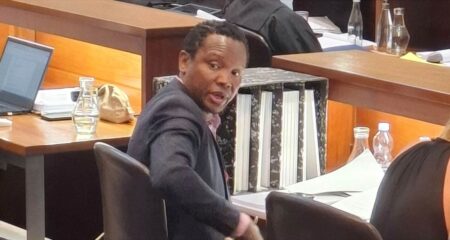
Avatars, warriors, wizards, whizz-kids, mavericks and dreamers. They could all be characters in a fantasy game played with gunships and lasers on a mobile device. But they are actually the descriptions given to employees at Alan Knott-Craig’s World of Avatar, the Stellenbosch-based cellular, social media and telecommunications company.
But there is no one there who resembles a wizard and no gunships or laser beams in the modern glass-and-brick building of La Gratitude, off Stellenbosch’s Cape cottage-lined Dorp Street. Most of the people at World of Avatar seem quite normal — in a techie kind of way.
Apart from a state-of-the-nation flat-screen TV in the lobby, which measures social media network and cellular platform Mxit’s user interactions, the only really unusual thing at World of Avatar is a large Rubenesque painting dominated by a half-naked woman holding a Daily Maverick, which decorates the caffeine-infused gathering point. The website is one of World of Avatar’s investments, financed because Knott-Craig likes the editor’s dream of quality news and opinion.
The gathering point is an important area of the office, highlighted by the presence of a connoisseur’s coffee machine managed by a barista formerly from Vida e Caffè, who spends his day making perfect cappuccinos with Mxit’s logo lingering in the froth. “It is where we all get together to talk and swap ideas,” Knott-Craig said. “And if we want to have a meeting, we often go out for a walk.”
Coffee and walking are clearly essential elements in the life of an avatar and Knott-Craig is often found wandering the Stellenbosch pavements or footpaths along the banks of the Eerste River. He said he used walking as an opportunity to network, hold meetings and look at the scenery.
Benefits of Mxit
“People feel far more comfortable when they are walking. Steve Jobs used to do it, too, and people said I was copying him. I also used to wear a hoody, but when people compared me to Mark Zuckerberg, I stopped,” he said.
Started by Knott-Craig as a company to let people build a community through cellphones, World of Avatar is now an investment holding company, although Mxit dominates with its sheer scale. Purchased for R330m in September last year from founder Herman Heunis, with whom some of the negotiations were done under an umbrella during a Stellenbosch walk, Mxit now has 55m registered users in 126 countries. They send between 500m and 850m messages a day. Knott-Craig thinks these volumes, and those he hopes to realise in the future, mean that “if we get things right, we could become the biggest company in the world”.
With 80% of users in SA, the rest of Africa is the next stop for Mxit domination. “If we can succeed on the rest of the continent, we can export our ideas to India, South America and other emerging markets,” Knott-Craig said.
One of the benefits of Mxit, which has been described as a place rather than a social media platform, is that it can be used on all phones, not just smartphones, on which WhatsApp and Facebook are more prolific. “Eighty percent of phones sold in the world are not smartphones,” Knott-Craig said. “These are the ones we are aiming at. This is where the volumes are. We are essentially targeting seven out of the eight billion people in the world, many of whom do not have credit cards or bank accounts, only cellphones.”
Mxit became known mostly for its chat rooms — about 65 of them, each subdivided into a number of other rooms where people could “hang out”, often in a fantasy disguise, paying one Moola (Mxit money equivalent to 1c) a message. But it is transforming into something far larger. Mxit is also becoming a mobile payments system and the Mxit Wallet is being tested at 19 vendors in Stellenbosch. They are paid with Moola on a mobile device.
Cellular money-spinner
It has also become a games portal, particularly because games are now considered the world’s biggest cellular money-spinner. Mxit’s most popular game is Moonbase, a war game with a theme of conquering and destroying while aiming for the ultimate victory medal awarded only after defeating the Martians and building a rocket ship to get back from the moon to Earth.
Another facet to Mxit is education, so school books and teaching devices are also becoming available. Already, homework helper and problem-solver Dr Math — in reality a group of university undergraduates from Stellenbosch University — help schoolchildren to solve their homework problems. It also has books, wallpaper, tickets and music.
“But read the book,” Knott-Craig said, having recently published the story of Mxit with writer Gus Silber. It is called Mobinomics, Mxit and Africa’s Mobile Revolution.
In the fantasy world of Mxit, which he had been trying to buy since 2006, Knott-Craig is an entrepreneur who explores the volumes created by the social media platform to bring in the profits. “Seventy percent of Mxit’s revenue comes from content sales, the rest from advertising. The more users we have, the more we can sell.”
Most of the sales are expected to come from two main businesses: education and games. “We are not involved in small businesses — education and entertainment are huge.” But Mxit, like most start-ups and turnaround companies, is yet to become profitable despite a turnover of about R120m/year.
Although keeping an avatar’s eye on the numbers, Knott-Craig said his job was to think about the dream and distil it to his wizards through continuous communication. “A lot of people are here because they like the purpose, but I have to translate the dream to them,” he said. “I make sure everyone is on the same page and we all know what we are aiming at.”
Ups and downs
A lot of his communication is written because Knott–Craig is also a writer, a talent perhaps inherited from his grandfather, who ran a group of small newspapers in the southern Cape. Knott-Craig Jr probably first became famous for an e-mail, which went viral, in which he wrote to his staff to persuade them to stop panicking and researching property in Perth.
But his business life has been technology-related and, like most entrepreneurs, he has had his ups and downs. In three years he co-founded five companies in the mobile services sector before becoming MD of iBurst, a broadband network operator, and then moving from Gauteng to Stellenbosch when he realised that his marriage and family were more important to him than his work.
But that was after he experienced the downside of being the son of his more famous father, Alan Knott-Craig, former CEO of Vodacom. Vodacom had bought a 24,9% stake in WBS Holdings, the 100% shareholder of iBurst and Wireless Business Solutions, two years after Knott-Craig Jr became MD. “They bought it to secure access to the WiMax spectrum of which Wireless Business Solutions was one of two companies with an existing allocation, the other company being Sentech,” Knott-Craig said, adding that he and his father were aware of the controversy it could cause. “We left the negotiations to others.”
He then got caught in the middle of nepotism accusations against his father. After retiring from Vodacom, Knott-Craig Sr found himself dominating the pages of the Sunday Times, accused of giving his son Vodacom office space, Internet technology access and preferential treatment for some of Knott-Craig Jr’s cellular applications.
“My father had to fight that fight; I got caught in the crossfire. We were aware that we had to work much harder than other people at ticking all the corporate governance boxes with Vodacom because of the obvious consequences,” Knott-Craig said. “You have to look at who was making the accusations; among other things, the accuser had lost out on the Vodacom black economic empowerment deal. I learned a lot, but in the end it was the best thing that happened. It pushed me towards the dream.”
Despite the controversy, having a mentor like his father is an edge that Knott-Craig said gave him a massive advantage. “I am very lucky to have my father to talk to and I do so almost every day,” he said. “We are both running turnaround operations so have lots to discuss.”
His father, who was with Vodacom for about 15 years, until 2008, left “because he thought he was going to die”, Knott-Craig said. “He joined Cell C because his health has improved and he managed to get another gig that appealed to him.”
The pavements and paths were obviously calling and Knott-Craig was feeling restless. “Now, would you like to go for a walk?” he asked. — (c) 2012 Mail & Guardian
- Visit the Mail & Guardian Online, the smart news source




